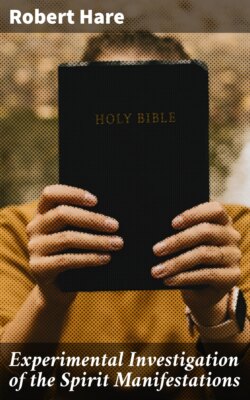Читать книгу Experimental Investigation of the Spirit Manifestations - Robert Hare - Страница 23
На сайте Литреса книга снята с продажи.
Letter from T. R. P. Ventura.
Оглавление306. “My Dear Sir: When you came two years ago to consult me as to the merit and propriety of your labours, I hesitated so much the less to encourage their publication, that having myself entertained the same ideas for a long time, I had been several times on the point of proclaiming them from the sacred chair. I do not fear then to affirm ‘that the publication of this important and serious work would be of incontestable usefulness, and tend strongly to enlighten opinion on a mass of curious facts, and thus prepare for the solution of high and important questions; for, I add, it is necessary that all the phases of the subject should be first presented by the laity, in order that the church may thus be enabled to form their judgment with full knowledge of the case.’
307. “I do not say enough, my dear sir, in pronouncing your work useful; I might have called it indispensable, had I foreseen the approaching invasion of that scourge which you so happily designate as a spiritual epidemic: a scourge whose sudden and universal propagation, in my opinion, notwithstanding its appearance of puerility, will constitute ONE OF THE GREATEST EVENTS OF OUR AGE. But how has it been both received and entertained?
308. “Commencing with your savans, it is impossible not to be alarmed by the obstinate incredulity which does not allow them to see what at the present time can be confirmed by anybody. Oculos habent et non vident.[9]
309. “Those individuals alarm me still more, who having given their attention, and of course seen, shake their heads as a sign of indifference and pity, as if the phenomenon exhibited was of a low character and beneath their notice. When they have descended to the foundation, they treat it with contempt.
310. “Then, finally, and very differently indeed, I feel myself frozen with terror by certain dispensers of truth, who, in their blindness, trifle without scruple with their most relentless enemies; so far have they forgotten their most serious teachings.
311. “I do not profess to be a prophet, sir, and do not know what the mercy or justice of God is preparing for us; but, like you, I tremble for the present, and hope for the future; for marvellous lessons are already presented to us in these passing phenomena.
312. “In fact, the justification of the church and of the faith are emanating from them: the definite condemnation of a fallen rationalism; and consequently, the approaching glorification of all the past in the true church, and even of that Middle Age, so calumniated, so ridiculed, and gratuitously endowed with so much darkness. The political events of these latter times have to justify that Middle Age, as respects good sense in the affairs of government; and behold these facts of a nature entirely foreign, coming to avenge its accusation of superstitious credulity. This reparation was necessary, and after all our own age has nothing to fear from it, for certainly it will not render injustice of any kind to the objective and useful progress of modern civilization.
313. “As for yourself, sir, you will enjoy the honour of having brought, by your luminous discussions, a large stone for the construction of this majestic edifice, and I rejoice in the encouragement I have given you. I need not enlarge on this subject, FOR SUCCESS HAS SPOKEN, and think I am sufficiently acquainted with you to know that you did not anticipate one so brilliant. You have known how to engage the attention of the learned, and people generally, by making your work attractive while it is instructive—a quality sufficiently rare to claim my congratulations. I will only add another word: had this work been confined to the notice of those phenomena whose advent we deplore, it would probably share their fate; but what will secure its perpetuity is your discussion of medical science which you put in apposition with your subject, and which will not long be able to resist the severe stricture of your logic. Therefore, be assured, it will be the learned, and especially physicians, that you will first convert to your doctrine. Philosophers will only surrender after them; but so far there is no doubt that you will have given rise to most serious reflections in all of them.
314. “I will not speak to you at present of two or three observations which I have made in reading your book, which we will discuss in private, and which only relate to some inaccuracy of doctrine, foreign, besides, to the principal subject of your work.
315. “Finally, my dear sir, I do not doubt that the God of truth will bless your labours. Continue them, for the subject is vast, and especially do not suffer yourself to be discouraged by the reasoning of light minds, ‘that in divulging all these things you favour their promulgation, when they had better be suppressed, &c. &c.’ A gross error! They might as well accuse the doctors of causing the cholera. And, beside, it is worthy of remark that all the cases of insanity lately developed in the midst of these exhibitions are due to thoughtless enthusiasm succeeding to an absolute state of doubt and disbelief. It could not well be otherwise; the prodigy which was doubted yesterday, and to-day is firmly established, will to-morrow be transformed into God. Truth alone is able to prevent and remedy such disastrous mishaps.
Receive, my dear sir, the assurance, &c.,
Le P. Ventura De Raulica,
Former General of the Monks, Examiner of the Bishops and of the Roman clergy.”
